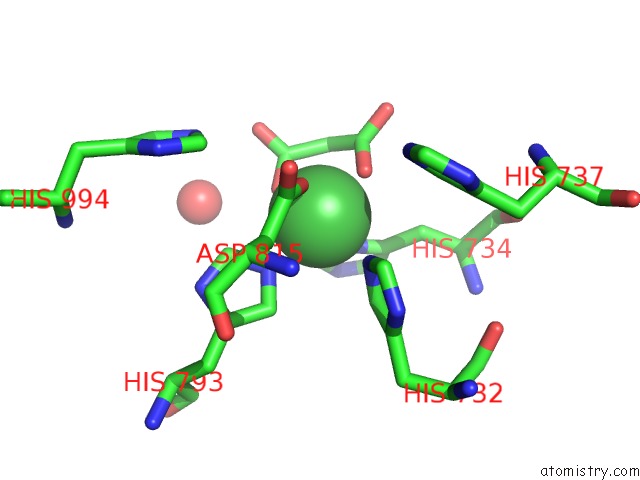Nickel »
PDB 5q2i-5q3l »
5q32 »
Nickel in PDB 5q32: Pandda Analysis Group Deposition -- Crystal Structure of DCLRE1A After Initial Refinement with No Ligand Modelled (Structure 30)
Protein crystallography data
The structure of Pandda Analysis Group Deposition -- Crystal Structure of DCLRE1A After Initial Refinement with No Ligand Modelled (Structure 30), PDB code: 5q32
was solved by
J.A.Newman,
H.Aitkenhead,
S.Y.Lee,
K.Kupinska,
N.Burgess-Brown,
R.Tallon,
T.Krojer,
F.Von Delft,
C.H.Arrowsmith,
A.Edwards,
C.Bountra,
O.Gileadi,
with X-Ray Crystallography technique. A brief refinement statistics is given in the table below:
| Resolution Low / High (Å) | 57.38 / 1.87 |
| Space group | P 21 21 21 |
| Cell size a, b, c (Å), α, β, γ (°) | 51.864, 58.047, 114.621, 90.00, 90.00, 90.00 |
| R / Rfree (%) | 26.9 / 32.8 |
Nickel Binding Sites:
The binding sites of Nickel atom in the Pandda Analysis Group Deposition -- Crystal Structure of DCLRE1A After Initial Refinement with No Ligand Modelled (Structure 30)
(pdb code 5q32). This binding sites where shown within
5.0 Angstroms radius around Nickel atom.
In total only one binding site of Nickel was determined in the Pandda Analysis Group Deposition -- Crystal Structure of DCLRE1A After Initial Refinement with No Ligand Modelled (Structure 30), PDB code: 5q32:
In total only one binding site of Nickel was determined in the Pandda Analysis Group Deposition -- Crystal Structure of DCLRE1A After Initial Refinement with No Ligand Modelled (Structure 30), PDB code: 5q32:
Nickel binding site 1 out of 1 in 5q32
Go back to
Nickel binding site 1 out
of 1 in the Pandda Analysis Group Deposition -- Crystal Structure of DCLRE1A After Initial Refinement with No Ligand Modelled (Structure 30)

Mono view

Stereo pair view

Mono view

Stereo pair view
A full contact list of Nickel with other atoms in the Ni binding
site number 1 of Pandda Analysis Group Deposition -- Crystal Structure of DCLRE1A After Initial Refinement with No Ligand Modelled (Structure 30) within 5.0Å range:
|
Reference:
J.A.Newman,
H.Aitkenhead,
S.Y.Lee,
K.Kupinska,
N.Burgess-Brown,
R.Tallon,
T.Krojer,
F.Von Delft,
C.H.Arrowsmith,
A.Edwards,
C.Bountra,
O.Gileadi.
Pandda Analysis Group Deposition To Be Published.
Page generated: Thu Oct 10 07:47:01 2024
Last articles
Zn in 9J0NZn in 9J0O
Zn in 9J0P
Zn in 9FJX
Zn in 9EKB
Zn in 9C0F
Zn in 9CAH
Zn in 9CH0
Zn in 9CH3
Zn in 9CH1